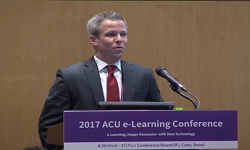There has been a consistent quest for higher education (especially university) in Nigeria due to the unstable academic system, coupled with the total number of candidates seeking admission into the various higher institutions in Nigeria yearly. On the...
http://chineseinput.net/에서 pinyin(병음)방식으로 중국어를 변환할 수 있습니다.
변환된 중국어를 복사하여 사용하시면 됩니다.
- 中文 을 입력하시려면 zhongwen을 입력하시고 space를누르시면됩니다.
- 北京 을 입력하시려면 beijing을 입력하시고 space를 누르시면 됩니다.
The History of Private Sector Participation in University Education in Nigeria (1989-2012) = The History of Private Sector Participation in University Education in Nigeria (1989-2012)
한글로보기https://www.riss.kr/link?id=A100237942
- 저자
- 발행기관
- 학술지명
- 권호사항
-
발행연도
2014
-
작성언어
Korean
- 주제어
-
KDC
235.605
-
자료형태
학술저널
-
수록면
69-89(21쪽)
- 제공처
-
0
상세조회 -
0
다운로드
부가정보
다국어 초록 (Multilingual Abstract)
There has been a consistent quest for higher education (especially university) in Nigeria due to the unstable academic system, coupled with the total number of candidates seeking admission into the various higher institutions in Nigeria yearly. On the basis of this, it has become obvious that the existing higher institutions, which were mainly government-owned, cannot cope with the ever increasing demand for higher education in Nigeria. One of the basic solutions to this challenge is the liberalization of participation in the education sector. The study applied both historical and sociological methodology in its investigation. This study examined the history of higher education in Nigeria, from 1989 to 2012. In addition, it also examined the role played by the private sector in the Nigerian educational sector in this present dispensation. The writers recommended that there should be a consistent upsurge of private higher institutions in Nigeria to adequately address the challenge posed by high prospective students` demand for university education. This is due to the fact that the government alone cannot handle the ever increasing demand for higher education in Nigeria.
동일학술지(권/호) 다른 논문
-
Understanding of Religious Discrimination and Implications in Anti-Discrimination Law in Korea
- 삼육대학교 선교와사회문제연구소
- ( Kuk Heon Lee )
- 2014
-
- 삼육대학교 선교와사회문제연구소
- ( Juvenal Balisasa )
- 2014
-
Prosperity Gospel in the context of Jesus' Teachings on Wealth in the Gospel of Luke
- 삼육대학교 선교와사회문제연구소
- ( Sampson M. Nwaomah )
- 2014
-
Seventh-day Adventist Identity and Destiny: Living the Calling
- 삼육대학교 선교와사회문제연구소
- ( Anna Galeniece )
- 2014





 KISS
KISS





